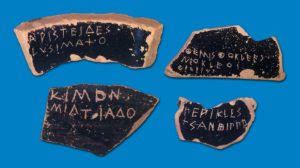[Greek] ὀστράκινος (ostrakinos), [Latin] fictilis: potshard, clay, tile, earthenware, earthen vessel, shell; 2Cor.4:7, 2Tim.2:20

Pottery shards were used in voting to banish those who were perceived as threatening the stability of the state. The names of the persons to be banished were written on these shards.
Background Information:
Ostracism: In ancient Greece ostracism (ostrakismos) was a procedure under Athenian democracy in which any citizen could be expelled from Athens for ten years. There were some times when a prominent citizen was perceived as threatening the stability of the state. A political practice was established in which this citizen could be banished without bringing any charges against him. At a meeting people decided, without debate, whether to hold a vote of ostracism of that person. Unlike a trial, no defense could be mounted by the person expelled. Unlike a matter initiated by the prosecutor, the vote occurred by the wishes of the electorate. If the people voted yes, then an ostracism would be held two months later. The people would vote using clay shards, which were considered like ancient scrap paper. The voter scratched the name of the person on his shard and deposited the shard in an urn. The person who received the most votes would be given 10 days to leave the city. The banished person would still be able to hold his property.
Plutarch’s Aristides 7:1-2 states “It befell Aristides to be loved first because of this surname, but afterward to be jealously hated, especially when Themistocles set the story that he had done away with the public courts of justice. So they assembled in the city from all the country round, and ostracized Aristides, giving to their envious dislike of his reputation the name of fear of tyranny. The ostracism was really a merciful exorcism of the spirit of jealous hate, which thus vented its malignant desire to injure, not in some inseparable evil, but in a mere change of residence of ten years. Plutarch Aristides 7:5-6 states “An utterly boorish fellow handed his ostrakon to Aristides, whom he took to be one of the ordinary crowd, and asked him to write Aristides on it. Aristides asked the man what possible wrong Aristides had done him. ‘None whatever. I don’t even know the fellow, but I am tired of hearing him everywhere called ‘The Just’. On hearing this, Aristides wrote his name on the ostrakon and handed it back. Aristides then departed the city.”
Old Testament: Pottery shards were less expensive than papyrus sheets in the ancient world. Shards were used for engraving scriptures, letters, inventory lists, notes, receipts, and manuscripts. The Dead Sea Scrolls were found inside clay pots near Qumran. In that you saw the feet and toes, partly of potter’s clay and partly of iron, it will be a divided kingdom (Dan.2:41). But the earthen vessel wherein it is sodden shall be broken (Lev.6:28). Should any of these creatures fall into a clay vessel, the vessel itself you must break (Lev.11:33). And he took a potshard to scrape himself; and he sat down among the ashes (Job 2:8). My strength is dried up like a potshard (Psa.22:15). Hi legs of iron, his feet art of iron and and part of clay (Dan.2:33). How they are regarded as earthen jars, the works of a potter’s hands (Lam.4:2).
New Testament: This term, meaning vessel, refers to men (members of the Church). Paul speaks of the paradox of the ministry. This treasure (glory of Christ) is held in earthen vessels (men). The earthen vessels are human, fragile, broken, and flawed followers of Christ. Often along with this glory comes opposition, affliction, and persecution. Paul also speaks of the Church having both precious and useless vessels. Those precious vessels, through their actions, will bring honor. Likewise, those useless vessels will bring dishonor, opposition, and destruction.
“But we hold this treasure in earthen vessels that the surpassing power may be of God and not from us.” 2 Cor. 4:7
The earthen vessels are the imperfect, vulnerable, and fragile persons whom God uses to spread His message.
“In a large household there are vessels not only of gold and silver but also of wood and clay, some for lofty and others for humble use.” 2Tim.2:20
The Church includes both precious and useless vessels.
Etymology: The Greek ostrakon is also related to the Greek osteon, meaning bone and oyster. This term is also related to the French oistre. The Latin fictilis, meaning made of earthenware, is related to the Latin verb fingere, meaning to mold or fashion. The Latin fictio means a making, fashioning, or feigning. Essentially, fiction is something which is invented or imagined.
Cancel culture: It seems our recent cancel culture has become the latest version of ostracism in this age of news media, social media, tech giants, and academia. Trump supporters, conservatives, Christians, and others have been continually ostracized, being called Deplorables, racists, hateful, bigots, and other such terms. TV shows and consumer products are also subject to cancellation.
Feburary 11: The Catholic Church celebrates the memorial of our Lady of Lourdes. Mary announces that she is the immaculate vessel which contains the baby Jesus.
Conclusion:
Ostracism, ostracize, oyster, fiction
Even in ancient Athens, there existed a form of cancel culture. Unlike a judicial procedure, anyone could bring up a measure to ostracize someone. A person could be summarily banished with out being accused of any charges. The abundance of pottery shards were likened to ancient scrap paper. Historical evidence shows that ostracism was initiated for both valid and invalid reasons (political antagonism and hatred). Socrates was ostracized because he mocked the court. The kids’ game Ostrakinda was a form of ancient dodgeball using sea shells.
In the Old Testament, Lam. 4:2 describes the abandoned, starving, and killed children like being regarded as broken earthen jars. This imagery continues the notion of man being fragile, broken, imperfect, and vulnerable earthen vessels (2Cor.4:7). Within these fragile vessels contains the surpassing power to spread and share the word of God. The Church contains both precious (good) and useless (indifferent and evil) vessels.
Update: Through great political power and persuasion, a new president has been legally elected through the electoral process. Yet about 47 percent do not have confidence in the integrity of our elections. https://www.rasmussenreports.com/public_content/politics/elections/election_2020/most_say_mail_in_voting_worked_but_47_say_fraud_likely This is not about Trump vs. Biden anymore. (Banish that thought). That ship has sailed. This is about the peoples’ confidence in the integrity of elections. Many of these past election lawsuits were turned down for legal and political considerations, yet the merits of these cases and forensic examinations have not been looked at. Yet, it is very curious that the Supreme Court is now taking up these cases. This point is illustrated in Arizona where there continues to be a political resistance (push-back) against a full forensic audit of the votes. Politicians (both senators and representatives), lawyers, media pundits have been politically “tarred and feathered” or even sued for voicing concerns about electoral fraud and irregularities. Time will tell whether their concerns will be validated or dismissed.
My sense is that there is already beginning a broader movement advocating for a full forensic audit of election ballots and voting.
Recent efforts to impeach President Trump have been another form of ostracizing and removing him from office. The Senate had just recently acquitted President Trump. Of the seven senators who voted to convict, two will retire. The remaining five senators will have to face their constituents (some of which are Trump supporters). These five senators may experience their own ostracism (being voted out) at the ballot box in the next election cycle. I think many may (and will) underestimate the connection that President Trump has with the American people.
Who would have thought that this term would lead to fictio (fiction)! (You really can’t make this up) ☺☺☺

